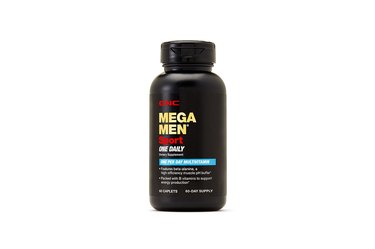
More than 40 percent of American adults are deficient in calcium, magnesium and vitamins A, C, D and E, according to a June 2014 report by the Environmental Working Group (EWG).
If you are one of those people, and have a hard time eating a balanced diet, you might consider taking a multivitamin. One of the most popular vitamin brands on the market, especially among men who work out, is GNC's Mega Men vitamins. These vitamins provide a number of essential nutrients in high doses, including:
Video of the Day
Video of the Day
- 3,333 percent of the recommended daily amount (RDA) of thiamin
- 2,500 percent of the RDA of niacin
- 100 percent of the RDA of vitamins A and E, chromium, manganese and iodine
But are these mega-high doses actually safe?
Here, learn the common — and rare — side effects and potential benefits of taking GNC's Mega Men vitamins.
A Note on Language
Here at LIVESTRONG.com, we use deliberate language when it comes to sex and gender, but because manufacturers still sell vitamins marketed to men and women, we’ve used those terms throughout this article. Men's and women's vitamins are different in that they are made based on the recommended daily value (DV) of nutrients as designated by the USDA for people assigned male or female at birth.
What Is GNC Mega Men?
GNC is a leading manufacturer and retailer of health, wellness and performance supplements. The company sells products online and in stores.
GNC's vitamins for men, sold under the name Mega Men, include:
- GNC Mega Men 50 Plus ($44.99, GNC.com; $31.69, Amazon.com)
- GNC Mega Men Sport ($44.99, GNC.com; $34.99, Amazon.com)
- GNC Mega Men Multivitamin ($44.99, GNC.com; $23.74, Amazon.com)
- GNC Mega Men Prostate and Virility ($29.99, GNC.com; $62.89 for 2 bottles, Amazon.com)
- GNC Mega Men Energy & Metabolism ($44.99, GNC.com; $31.99, Amazon.com)
These supplements can be taken by active men who want to feel their best. Each formulation provides a blend of vitamins, minerals and antioxidants that support male health, sports performance, metabolic function and more. They are also made with stevia and no added sugar or artificial sweeteners.
Are GNC Mega Men Vitamins Good For You?
Mega Men vitamins provide at least 100 percent of the daily recommended intake for over 20 vitamins and minerals, including key nutrients like vitamin C, B6 and B12, according to GNC's website.
In terms of quality, GNC Mega Men products must pass 150 quality checks before getting sold. While GNC states formulas are clinically tested and ensure a gradual release of nutrients, it should be noted that these vitamins are not certified by the U.S. Pharmacopeia (USP) or the NSF International, and supplements in general are not required to be FDA-approved.
Related Reading
What Are the Benefits of GNC Mega Men Vitamins?
Taking Mega Men vitamins can have the following benefits to your health:
Immune Support
Mega Men multivitamins have 300 milligrams of vitamin C and 25 milligrams of zinc, which are about 333 percent and 227 percent of your RDA respectively.
Both nutrients support immune health, protect against infection and disease and support production of immune cells, according to the Cleveland Clinic.
Cardiovascular Support
Antioxidants play an important role in preventing heart disease: They help protect cells from free radicals that can cause disease, according to the Mayo Clinic. That's why Mega Men vitamins come with an antioxidant blend including alpha-lipoic acid, lycopene and zeaxanthin.
It also contains folic acid, or folate, which has been linked to lower rates of stroke. In one April 2015 study in JAMA, people who took folic acid supplements and medication to reduce blood pressure were less likely to have a stroke than people who took the blood pressure medication alone.
Bone and Digestive Support
Mega Men vitamins have 200 percent RDA of vitamin D and 15 percent RDA of calcium, both nutrients needed for strong, healthy bones and a healthy gut.
In fact, vitamin D and calcium are associated with reduced risk of colorectal cancer, according to a December 2013 study in the Journal of Gastrointestinal Oncology. Both are also important for bone health, per the National Institutes of Health.
Good Source of Vitamin D
Most people have trouble getting enough vitamin D from diet and sunlight exposure alone. Most multivitamins, including GNC Mega Men Sport, contain a big dose of it. Two capsules contain 1,600 international units, meeting 400 percent of your daily needs. For reference, the highest amount you can safely take is 4,000 international units (IU), or 1,000 percent of your daily value, per the National Institutes of Health.
Good Source of B Vitamins
Mega Men Sport vitamins meet 100 percent or more of the RDA for all eight B vitamins, including 1,000 percent of thiamin (B1), riboflavin (B2) and B6, according to GNC.
They also have B12 — or cyanocobalamin — which plays a key role in red blood cell formation, DNA synthesis and is associated with reduced risk of anemia, according to the National Institutes of Health.
Good Source of Amino Acids
Amino acids are essential parts of protein and the building blocks of muscle. Mega Men vitamins have L-glutamine and L-arginine, two of the major amino acids associated with muscle growth and weight reduction, according to a June 2019 review in the Clinical Nutrition Journal.
Good Source of Lutein and Zeaxanthin
Both lutein and zeaxanthin — nutrients known as carotenoids — are important for eye health (specifically protection of the macula from blue light), according to an April 2013 review in Nutrients. Mega Men vitamins contain 2 milligrams of lutein and 400 micrograms of zeaxanthin, however both can be found in greens like kale, spinach and broccoli.
What Are the Side Effects of GNC Mega Men Vitamins?
While GNC Mega Men vitamins look good at first sight, they have very high doses of certain vitamins that could lead to negative side effects.
Side effects of Mega Men vitamins — including GNC Mega Men Performance and Vitality and GNC Energy and Metabolism varieties — include:
Too Much Vitamin B
GNC Mega Men also contains large doses of vitamin B6, niacin, thiamin, riboflavin and other B-complex vitamins.
In mild cases, vitamin B toxicity can cause, per the Mayo Clinic:
- Skin flushing
- Upset stomach
- Allergic reactions
In severe cases, high doses of vitamin B6 may result in sensory neuropathy — a disorder that causes pain and numbness in the limbs, according to the Linus Pauling Institute.
These symptoms, however, are more likely to occur when multivitamins with B-complex have a daily dose that exceeds 1,000 milligrams.
Tip
Taking B vitamins with food could help prevent upset stomach, according to the Cleveland Clinic.
Too Much Vitamin A
This formula provides 100 percent of the RDA of vitamin A. But if you eat a balanced diet, you may already have enough vitamin A in your system.
Taking much too much vitamin A can cause, per StatPearls Publishing:
- Headaches
- Diarrhea
- Vomiting
- Dizziness
- Thinning of the bones
Too Much Selenium
Getting too much selenium from supplements has been linked with prostate cancer, although more research is needed.
One February 2014 study in the Journal of the National Cancer Institute linked selenium supplements with a higher risk of prostate cancer among men who already had high selenium levels. The report concluded men should avoid selenium supplementation at doses higher than the daily recommended intake.
The daily recommended dose of selenium for an adult male is 55 micrograms, per the National Institutes of Health. GNC Mega Men Sport contains 200 micrograms. If you already get enough selenium from food, such as mushrooms and eggs, you may reconsider taking a supplement with high doses.
Tip
To prevent any adverse reactions, stick to the daily recommended dosage as listed on the label. Always consult your doctor before starting any dietary supplement, including anything from the GNC Mega Men line.
Do You Need to Take GNC Mega Men Vitamins?
Although vitamins are useful in certain situations, the best way to get the nutrients you need is through food.
If you eat a balanced diet — one containing plenty of fruits, vegetables and whole grains — and do not have any chronic health conditions, you'll get the proper mix of nutrients needed for good health.
Foods With the Highest Vitamin Content
Some of the most nutrient-dense foods (relative to number of calories), that can fulfill vitamin and mineral needs include, per Harvard Health Publishing:
- Leafy greens: chard, collard greens, kale, mustard greens and spinach
- Vegetables: bell peppers, Brussels sprouts, mushrooms and sweet potatoes
- Fruits: cantaloupe, papaya, raspberries and strawberries
- Dairy: low-fat yogurt and eggs
- Seeds: flax, pumpkin, sesame and sunflower
- Dried beans: garbanzo, kidney, navy and pinto
- Nuts: almonds and cashews
- Grains: barley, oats, quinoa and brown rice
- Fish: salmon, halibut, cod, scallops, shrimp and tuna
- Meat: lean beef, lamb, venison, chicken and turkey
Are GNC Men's Vitamins Safe?
We've covered the benefits and side effects, but you may still be wondering: Are Mega Men vitamins safe to take?
When taken in appropriate doses, GNC's Mega Men vitamins are safe and unlikely to cause vitamin toxicity.
However, if you are overdoing it in the supplement department (i.e., mixing Mega Men with other vitamins or taking several doses at once) or have been advised by your doctor to limit certain vitamins, you might want to avoid taking them.
Ultimately, if you already eat a healthy, balanced diet and have no known chronic health conditions, you likely do not need this supplement. It's really for those who need to fill nutrition gaps and prevent vitamin deficiencies.
Tip
A quick chat with your doctor will determine whether these vitamins are right for you, along with directions on how to take them safely.
- Linus Pauling Institute: Vitamin B6
- The Ohio State University: Long-Term, High-Dose Vitamin B6/B12 Use Associated With Increased Lung Cancer Risk Among Men
- GNC
- National Sanitation Foundation
- Cleveland Clinic: "8 Vitamins & Minerals You Need for a Healthy Immune System"
- Mayo Clinic: "Antioxidants"
- Journal of Gastrointestinal Oncology: "Diet and supplements and their impact on colorectal cancer"
- National Institutes of Health: "Calcium and Vitamin D: Important at Every Age"
- The Journal of the National Cancer Institute: "Baseline Selenium Status and Effects of Selenium and Vitamin E Supplementation on Prostate Cancer Risk"
- National Institutes of Health: "Selenium"
- JAMA: "Efficacy of Folic Acid Therapy in Primary Prevention of Stroke Among Adults With Hypertension in China The CSPPT Randomized Clinical Trial"
- EWG: "How Much Is Too Much?"
- U.S. Pharmacopeia: "Services"
- Mayo Clinic: "Vitamin B12"
- StatPearls Publishing: "Vitamin A Toxicity"
- Harvard Health Publishing: "Getting your vitamins and minerals through diet"
- National Institutes of Health: "Vitamin D"
- National Institutes of Health: "Vitamin B12"
- Nutrients: "Dietary Sources of Lutein and Zeaxanthin Carotenoids and Their Role in Eye Health"
- Cleveland Clinic: "The Best Time to Take Vitamins"
- National Institutes of Health; Vitamin A and Carotenoids; April 2006
- "PNAS"; Antioxidants Prevent Health-Promoting Effects...; M. Ristow et al.; May 2009
